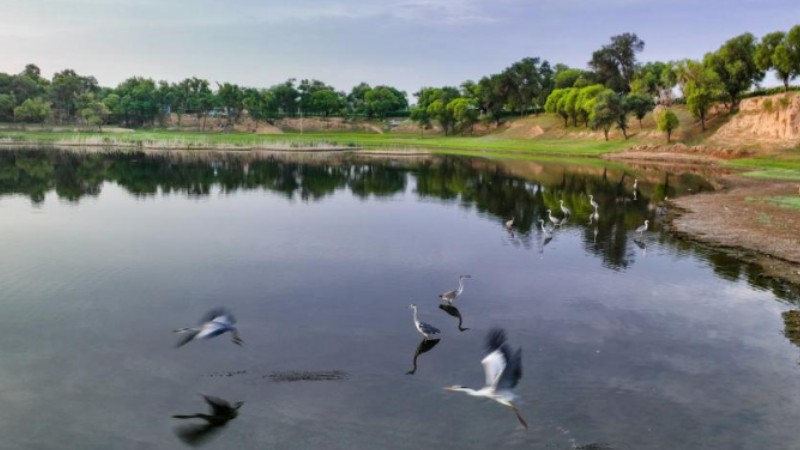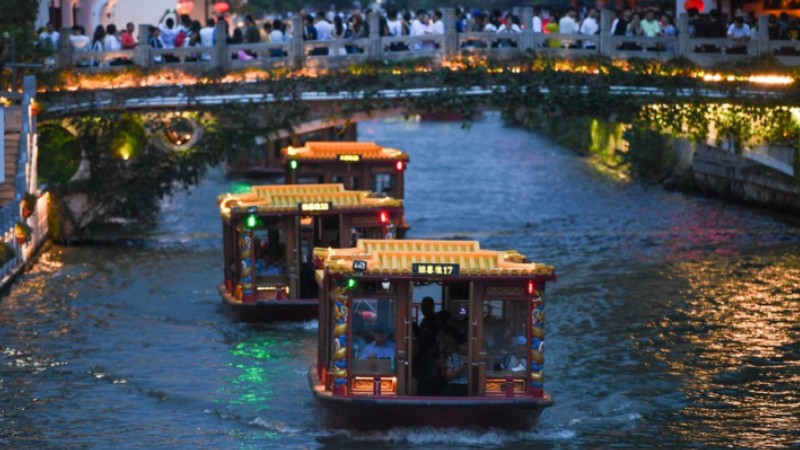Documentary spotlights WWII tragedy's impact on British families and courage of Chinese fishermen
LONDON, Aug. 23 (Xinhua) -- The Sinking of the Lisbon Maru, a documentary about a lesser-known WWII tragedy involving Japanese fascists and British prisoners of war (POWs), has highlighted the impact of war on British families and brought into light the courage and humanity of Chinese fishermen.
In October 1942, "Lisbon Maru," a cargo vessel requisitioned by the Japanese army to carry more than 1,800 British POWs from Hong Kong to Japan, was hit by the U.S. army off the Zhoushan Islands in China's Zhejiang province. Local fishermen risked their own lives and rescued over 300 POWs.
A special screening of the recently-finished documentary was held at the British Film Institute Southbank theater in London last week. Some 400 relatives of the British POWs on board the Lisbon Maru were invited to watch the film.
Survivors of the Lisbon Maru incident interviewed by Fang Li, the documentary's producer and director, recalled in the film that after the ship was hit, the Japanese troops soon evacuated but left the POWs battened down below deck. When the POWs managed to escape the confinement and started jumping into the sea, they were shot by the Japanese troops. Chinese fishermen risked their lives amid the shooting and rescued as many POWs as possible using their small sampan boats.
Retired British soldier Brian Finch, who has been committed to collecting the historical documents on the Lisbon Maru, told Xinhua that the documentary exposed the cruelty of the Japanese soldiers and showed "the incredible courage and humanity" of the Chinese fishermen.
As the credits rolled, the audience gave the documentary a standing ovation. In tearful gratitude, Eileen Fletcher shared with the audience that her brother, a teenager when the Lisbon Maru sank, survived thanks to "the wonderful Chinese fishermen." Her brother later became an officer in the Royal Horse Artillery.
Fletcher later told Xinhua that the documentary brings to light a forgotten tragedy, and its long-lasting impact on the affected families was rarely known. When her brother was alive, he never spoke about it, and the trauma caused by the incident left him awake screaming at night.
"It's the forgotten war," she said. "And I think through this type of film, not only here, the whole world would be able to know what went on and how they suffered for us to have freedom."
Amanda Christian, whose grandfather went down with the Lisbon Maru, was among the first respondents to Fang's search for relatives of the Lisbon Maru POWs as he prepared for the documentary. She was moved to tears by the documentary and was happy that it was completed despite the setbacks caused by the COVID-19 pandemic.
"It (Lisbon Maru Incident) should never have been kept underneath. It should be spoken about years and years ago. My dad for years didn't know what actually happened on the Lisbon Maru," she told Xinhua.
Christian went to Zhoushan in 2019 with a group of POW relatives after the wreck of the sunken ship had been located by Fang and his team with the help of modern technology several years before. After paying respect to her grandfather throughout her life through an empty grave in Britain, she could finally properly remember him when a boat took her to the water directly above the sunken Lisbon Maru. During her stay in China, she also met with the last fisherman alive, who died less than a year after the meeting.
"It was just amazing, absolutely very, very honored to have been part of it," she said.
In remarks delivered after the screening, Chinese Ambassador to Britain Zheng Zeguang said, "In the fight against fascist aggressors, China and the UK were allies, and the Lisbon Maru Incident is one of the best examples of people from both countries supporting each other at difficult times."
Zheng noted that history must not be forgotten and called for a joint effort to carry forward the shared remembrance and turn it into a new linchpin for friendship between the Chinese and British people.
Tony Banham, a British historian whose 2006 book The Sinking of the Lisbon Maru: Britain's Forgotten Wartime Tragedy, laid the groundwork for the documentary. He said he was delighted with how the documentary turned out and succeeded in emphasizing the impact of war on families.
"There's never been more important than it is at the moment for people from different countries to meet together and chat and understand that it doesn't really matter if you're born in London, or you're born in Beijing. You are people," he said. "And that message should be hammered home every day, in my opinion, because there is no more important message if we really want to survive as a species of human beings in the world."
Morgana Warren-Jones, a 28-year-old musician whose great uncle died in the Lisbon Maru tragedy, told Xinhua that she would spread the word about the documentary on social media and hopes to generate more discussion among the younger generation.
"This film shows that a world with peace is a so much better world," she said. "Making good relationships with people from different cultures and building bridges is a really important thing."
Photos
Related Stories
- Feature: Japan's "poison gas island" and lingering shadows of war atrocities
- Symposium on legacy of resistance war against Japanese aggression held in SW China
- Feature: Ahn Jung-geun, fighter against Japanese aggression commemorated by China, South Korea
- Last 39 Nanjing Massacre survivors still waiting for apology
- Memories of resistance refreshed through China, S. Korea's years-long fight against Japanese aggression
Copyright © 2023 People's Daily Online. All Rights Reserved.









